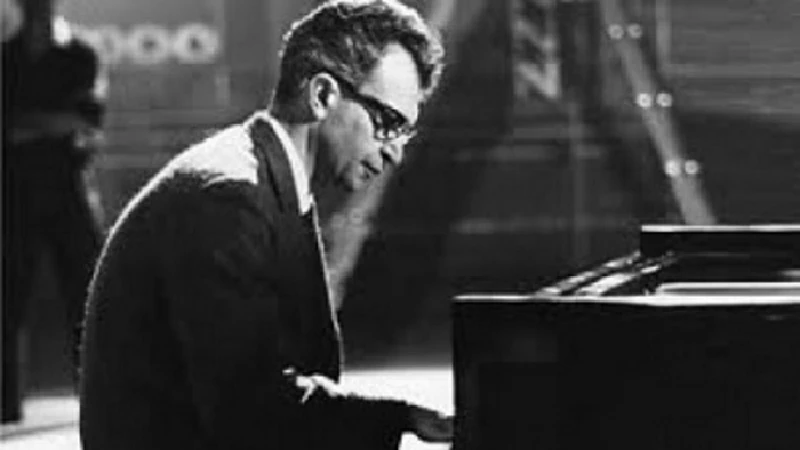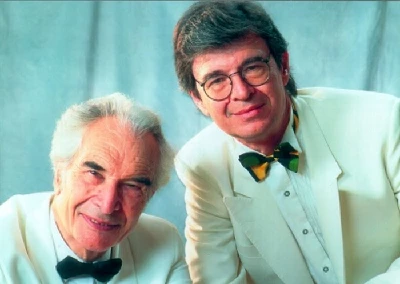Dave Brubeck - 1920-2012
by Lisa Torem
published: 6 / 12 / 2012

intro
Lisa Torem reflects on the career of jazz musician and pianist Dave Brubeck, who died in December
Music critic, Ted Gioia, who wrote ‘A History of Cool Jazz in 100 Tracks’, said about Dave Brubeck and Paul Desmond’s recording, ‘You Go to My Head’ (1952), “This is the quintessential cool jazz duet. Fans who want to understand the chemistry between these artists should start here.” “Cool Jazz” was a post World War II musical style, which developed in the 1950s. It was known for strong melodic development and mellow tempos, as opposed to the incendiary Bebop style that players like Charlie Parker posited. American jazz impresario, pianist and performer, Dave Brubeck, who died December 5th, 2012, will always be remembered as one of the chief innovators of this movement. Dave Brubeck’s mother, Elizabeth Ivey, was a classical pianist, but his father was a rancher. Brubeck fell in love with the instrument when he was a teenager. He played small club dates to pay for schooling and was planning to study veterinary medicine – his family had moved to a ranch in California and he had had plenty of experience caring for God’s creatures. But he changed his major to music and studied with French music professor, Darius Milhaud. The relationship was so memorable that he named a son after his mentor. He committed himself to performing, interpreting and composing jazz material founded on counterpoint and other classical fundamentals. According to music historian, Ashley Khan, in ‘In His Own Sweet Way’, a documentary produced by director Clint Eastwood, to commemorate Brubeck’s 90th birthday, for TCM (Turner Classic Movies), Milhaud “had this very, very open view of music” for a classical composer. “He gave me direction. Never gave up on jazz,” Brubeck said. But the feelings of admiration were mutual. “You want to be a composer like me, I want to be like you,” Milhaud confided to his American protege. In 1942 Brubeck was drafted into the Army under General George S. Patton. He performed with the only racially integrated unit, so he was shocked to come home and find that his black band mates often experienced discrimination while touring. The Dave Brubeck Quartet was formed in 1951. Their album of 1959, ‘Time Out’, sold more than one million copies. With Paul Desmond, on sax, Joe Morello on drums, and Eugene Wright on bass, Brubeck commanded the fiery foursome. Khan also says in 'In His Own Sweet Way' that Desmond longed to play with Brubeck. “It was Paul who decided, ‘I have to play with Dave Brubeck,’ because Dave was probably happy to have a trio.” Yet fans couldn’t imagine them playing apart. ‘Take Five’ was played in 5/4 time. Brubeck formed a bird’s nest of melodies, executing each note with grace and a laid back confidence. He would comp the grinding rhythm and stake out Desmond’s claim. The saxophonist would contribute a gyrating lick that floated over Brubeck’s keys. Around that same time in the mid 1960s, Brubeck would record ‘Take The A Train,’ an American classic. He would coolly lurk behind the beat, and then with complete commitment command his own solo. Years later what could be more American than ‘Unsquare Dance’ in the odd 7/4 time? But Brubeck could pour steam heat into cool like nobody else, even on the more global material. On the ‘Koto Song’ intro. he began with an ethereal pentatonic melody, to which Desmond added his own brand of chiseled cool. What we got was eight minutes of head nodding, toe slamming and contemplative bliss. Brubeck would then serve up dream-like clusters and paint images of sublime peace through pedal point and other classical variants. Did he express an interest in Latin America? On ‘Besame Mucho,’ his blues notes were as seductive as a black panther’s gait. And the legendary ‘Blue Rondo a la Turk,’ executed in the unheard of time signature of 9/8, was conceived after the quartet navigated the fragrant marketplaces and cacophonous souks of Istanbul’s Grand Bazaar. (Their new brand of cool music inspired an international movement, which led to world tours.) They employed these exotic textures and multi-sensorial images into what became a vibrant, cool jazz cocktail. By the end of Brubeck’s career, he had recorded more than a hundred albums and written two ballets. He was the first jazz musician to appear on the cover of ‘Life Magazine’ in 1954. Brubeck married his sweetheart, Iola, after graduating college. Three of their sons formed ‘Two Generations of Brubeck’ with their father and they continued performing the legendary hits. By the autumn of Brubeck’s career, he had recorded more than an hundred albums and written two ballets. He had been the first jazz musician to appear on the cover of ‘Life Magazine’ in 1954. When I interviewed Dave Brubeck over the phone for Pennyblackmusic, he put me on hold and then scrambled to get the door a few seconds before our conversation ended. It wasn’t because he had run out of interesting things to say - every subject we discussed elicited memories of a grand career and delightful music-related anecdotes - it was much more simple than that. Iola was at the door and she needed help carrying in the groceries. So even though Dave Brubeck will be remembered by friends, family and fans for an astounding number of cerebral compositions and performances, I’ll remember him foremost, as the warm, loving husband and father he was when the spotlight faded. But one of his sons, Michael Brubeck, said it so much better in his poem, ‘The Sensitive Man’ - “He is the essence of talent, but he has time to care and love me.”
interviews |
|
Interview (2011) |

|
| Jazz pianist and composer Dave Brubeck talks to Lisa Torem about his nearly seventy years long musical career, while his son Darius pays personal testimony to his father |
most viewed articles
current edition
Peter Doherty - Blackheath Halls, Blackheath and Palace Halls, Watford, 18/3/2025 and 21/3/2025Armory Show - Interview with Richard Jobson
Liz Mitchell - Interview
Deb Googe and Cara Tivey - Interview
Lauren Mayberry - Photoscapes
Max Bianco and the BlueHearts - Troubadour, London, 29/3/2025
Garfunkel and Garfunkel Jr. - Interview
Maarten Schiethart - Vinyl Stories
Clive Langer - Interview
Sukie Smith - Interview
previous editions
Heavenly - P.U.N.K. Girl EPBoomtown Rats - Ten Songs That Made Me Love....
Trudie Myerscough-Harris - Interview
Doris Brendel - Interview
Beautiful South - Ten Songs That Made Me Love...
Dwina Gibb - Interview
Kay Russell - Interview with Kay Russell
Pulp - Ten Songs That Made Me Love...
Barrie Barlow - Interview
Sound - Interview with Bi Marshall Part 1
most viewed reviews
current edition
Davey Woodward - Mumbo in the JumboNigel Stonier - Wolf Notes
Wings - Venus and Mars
Kate Daisy Grant and Nick Pynn - Songs For The Trees
Only Child - Holy Ghosts
Neil Campbell - The Turnaround
Philip Jeays - Victoria
Darkness - Dreams On Toast
Suzanne Vega - Flying With Angels
Charles Ellsworth - Cosmic Cannon Fodder
Pennyblackmusic Regular Contributors
Adrian Janes
Amanda J. Window
Andrew Twambley
Anthony Dhanendran
Benjamin Howarth
Cila Warncke
Daniel Cressey
Darren Aston
Dastardly
Dave Goodwin
Denzil Watson
Dominic B. Simpson
Eoghan Lyng
Fiona Hutchings
Harry Sherriff
Helen Tipping
Jamie Rowland
John Clarkson
Julie Cruickshank
Kimberly Bright
Lisa Torem
Maarten Schiethart